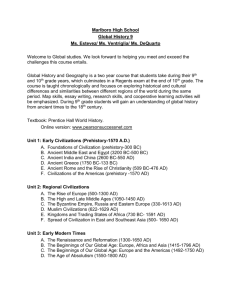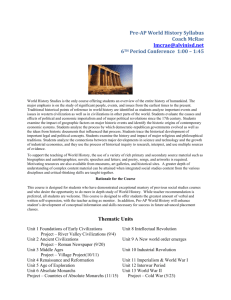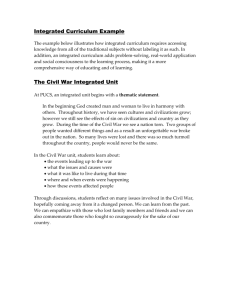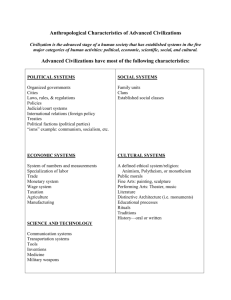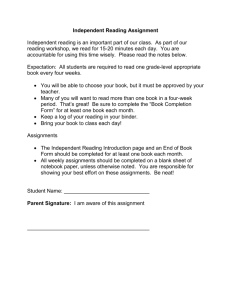AP World History - Plain Local Schools
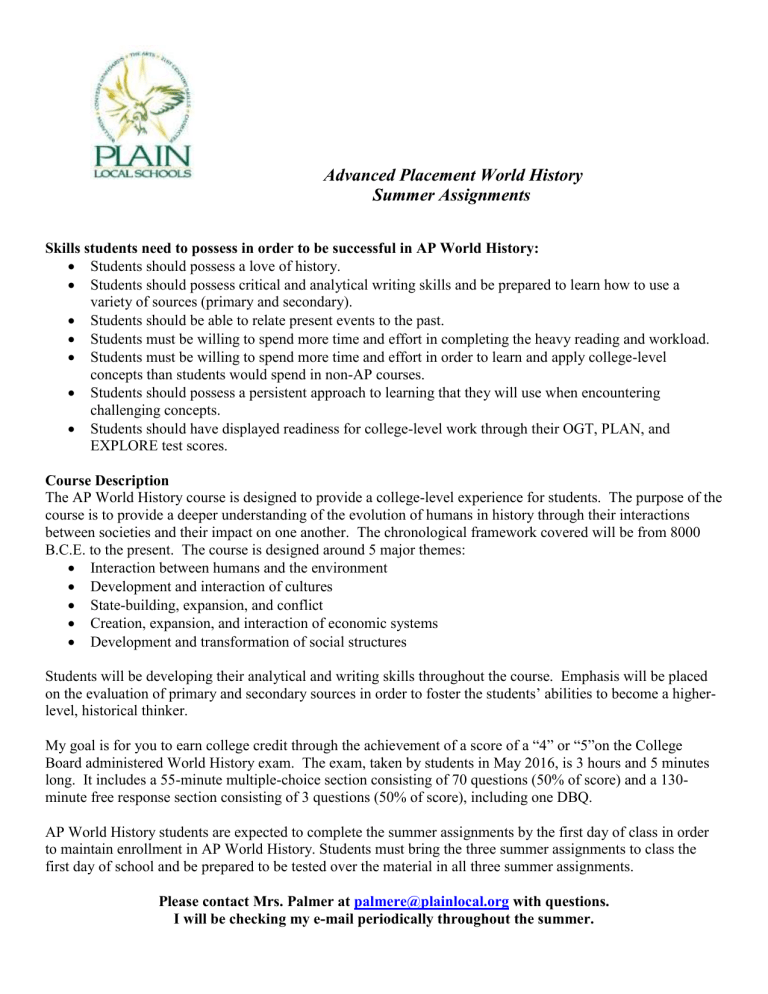
Advanced Placement World History
Summer Assignments
Skills students need to possess in order to be successful in AP World History:
Students should possess a love of history.
Students should possess critical and analytical writing skills and be prepared to learn how to use a variety of sources (primary and secondary).
Students should be able to relate present events to the past.
Students must be willing to spend more time and effort in completing the heavy reading and workload.
Students must be willing to spend more time and effort in order to learn and apply college-level concepts than students would spend in non-AP courses.
Students should possess a persistent approach to learning that they will use when encountering challenging concepts.
Students should have displayed readiness for college-level work through their OGT, PLAN, and
EXPLORE test scores.
Course Description
The AP World History course is designed to provide a college-level experience for students. The purpose of the course is to provide a deeper understanding of the evolution of humans in history through their interactions between societies and their impact on one another. The chronological framework covered will be from 8000
B.C.E. to the present. The course is designed around 5 major themes:
Interaction between humans and the environment
Development and interaction of cultures
State-building, expansion, and conflict
Creation, expansion, and interaction of economic systems
Development and transformation of social structures
Students will be developing their analytical and writing skills throughout the course. Emphasis will be placed on the evaluation of primary and secondary sources in order to foster the students’ abilities to become a higherlevel, historical thinker.
My goal is for you to earn college credit through the achievement of a score of a “4” or “5”on the College
Board administered World History exam. The exam, taken by students in May 2016, is 3 hours and 5 minutes long. It includes a 55-minute multiple-choice section consisting of 70 questions (50% of score) and a 130minute free response section consisting of 3 questions (50% of score), including one DBQ.
AP World History students are expected to complete the summer assignments by the first day of class in order to maintain enrollment in AP World History. Students must bring the three summer assignments to class the first day of school and be prepared to be tested over the material in all three summer assignments.
Please contact Mrs. Palmer at palmere@plainlocal.org
with questions.
I will be checking my e-mail periodically throughout the summer.
Summer Assignments
Assignment #1: World History Socratic Seminar – Book Reading and Questions
Students will be choosing to read one of the books listed below. You may obtain the book from the Plain or
North Canton Library, Books a Million, amazon.com, etc. Plain Branch Library does have several copies of each of the books set aside for you to check out. If interested, please see Mr. Callahan and tell him you are checking out the book for Mrs. Palmer’s AP World History:
Guns, Germs, and Steel by Jared Diamond
The Human Web by William Hardy McNeill
Salt: A World History by Mark Kurlansky
A History of the World in Six Glasses by Tom Standage
As you read the book, you must write one Socratic Seminar question for each chapter of the book. These questions should be HAND-WRITTEN. Each question must include the following:
1.
Provide a quote or chapter background sentence or two as a prelude to each question.
2.
Each question should be open-ended and open to interpretation by others in the class through a discussion, but based upon the chapter read and applicable to world history, government, economics, geography, civilizations, or development.
Example:
Chapter 11:
“ . . . the ultimate cause of food production led to the proximate causes of germs, literacy, technology, and centralized government.” ( Guns, Germs, and Steel 195). In this statement, Diamond creates a thesis, or argument about why the world was both plagued by disease and aided in education due to food production. How did agriculture create civilizations? When did this occur?
You will be graded on both the quality of questions and your participation in the Socratic Seminar during the first week of class. Bring your questions the first day of class. This is an INDIVIDUAL assignment. All work should be completed by you without the aid and input of other students and resources.
Assignment #2: The Earth and Its Peoples, Chapters 1-3
Students will be assigned the text The Earth and Its Peoples (packet) for the duration of the summer and a textbook the 2015-2016 school year. You will use the text to complete the following before the first day of school:
1. Vocabulary: For each chapter hand-write out the definitions of the vocabulary words. You may write your terms on note cards, notebook paper, or in a vocabulary notebook. The words and definitions are located on the outer sides of the text throughout the chapter, and the terms are also listed at the end of each chapter.
2. Notes: For each of the chapters and sections listed below, take hand-written notes on the specified topics or civilizations.
Chapter 1: From the Origins of Agriculture to the First River-Valley Civilizations
Before Civilization
Environment + Technology: The Iceman
Mesopotamia
Egypt
The Indus Valley Civilizations
Chapter 2: New Civilizations in the Eastern and Western Hemispheres, 2200-250 B.C.E
Early China, 2000-221 B.C.E
Environment + Technology: Divination in Ancient Societies
Nubia, 3100 B.C.E-350 C.E.
Celtic Europe, 1000-50 B.C.E.
First Civilizations of the Americas: The Olmec and Chavin, 1200-250 B.C.E
Chapter 3: The Mediterranean and Middle East, 2000-500 B.C.E
The Cosmopolitan Middle East, 1700-1100 B.C.E
The Aegean World, 2000-1100 B.C.E
The Assyrian Empire, 911-612 B.C.E.
Israel, 2000-500 B.C.E
Phoenicia and the Mediterranean, 1200-500 B.C.E
Environment + Technology: Ancient Textiles and Dyes
3. Diversity + Dominance: For each chapter, read the primary and secondary sources of information in the
Diversity + Dominance and complete the “Questions for Analysis.” Write out your answers to the questions in a notebook or on notebook paper (2-5 sentences each).
4. AP* Review Questions for Chapter 1 (2, 3): For each chapter, write out the multiple-choice questions and correct answers (letter and wording) in a notebook or on notebook paper.
The first weeks of school we will work through additional content in these chapters, including map-making, timeline-creating, primary and secondary source evaluation, writing, and assessment. Make sure you understand the main ideas from these chapters and have completed these assignments as they will be collected and graded the first day of class. NOTE: Unit I will cover Chapters 1-7 if you would like to work ahead on the chapters.
Assignment #3: WHAP World Map and Writing Terms
Students will memorize the writing vocabulary terms as specified by the College Board listed below and the
4.
5.
6. world regions on the map on the following page. You will be tested on the regions and terms the first day of school. These ideas you will be using daily in WHAP to refer to countries/regions and writing.
1.
2.
Analyze : determine various factors or component parts and examine their nature and relationship
Assess/Evaluate : judge the value or character of something; appraise; weigh the positive and negative points; give an opinion regarding the value of; discuss the advantages and disadvantages of
3. Compare : examine for the purpose of noting similarities and differences
Contrast : examine in order to show dissimilarities or points of difference
Describe
Discuss
: give an account of; tell about; give a word picture of
: write about; consider or examine by argument or from various points of view; debate; present the different sides of
7. Explain : make clear or plain; make clear the causes or reasons for; make known in detail; tell the meaning of

